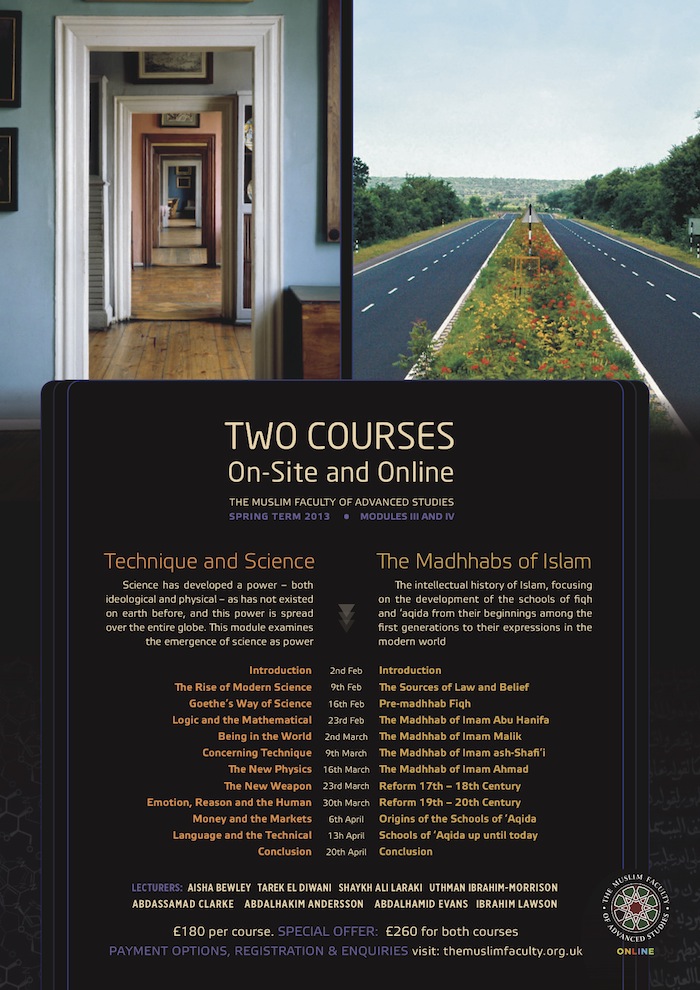Review
All lectures are freely available on this site.
1. General Muslim Studies II: The Madhhabs of Islam
The intellectual history of Islam, focusing on the development of legal and theological schools from their beginnings among the first generations to their expressions in the modern world, particularly with respect to the relationship of the people of knowledge to power.

Course Leader: T. S. Andersson Director of Studies, MFAS
- Introduction – T. S. Andersson Director of Studies, MFAS FREE
“Based on Ibn Khaldun’s notion that sciences and intellectual disciplines are not abstract entities, but crafts (sana’i’) formed as integral parts of the surrounding society, the purpose of the course is to throw a light on the internal and external factors that determined, or at least played some part in, the evolution of the intellectual legacy that remains active and applicable to this day.” -
A Classical Outline of the History of the Madhhabs – T. S. Andersson Director of Studies, MFAS FREE
“The lecture examines Ibn Khaldun’s views on the history of the sciences of fiqh and ‘aqida, which also includes his analysis of the relationship between these two disciplines, and the larger political, social and economic history of Muslim civilisations.” -
Pre-madhhab fiqh and ‘aqida – Ustadha Aisha Bewley FFAS
The lecture examines the developments in legal practice and scholarship after the death of the Prophet, may Allah bless him and grant him peace, until the formation of madhhabs around leading scholars of the second/eight century. -
The madhhab of Imam Abu Hanifa – Ustadh Hasan Anyabwile
The lecture examines the formation of the madhhab, Imam Abu Hanifa's relationship to power, his main students, the madhhab in power during the Mughal and Osmani Dawla and its retreat from power separating into the Deobandi and Braelwi branches in India. -
The Importance of Imam Malik – Dr. Yasin Dutton FFAS
“In this contribution, we consider the importance of Imam Malik, especially his magisterial work the Muwatta’, in preserving our historically most valid – because closest to the source – transmission of Sunnah and hadith as understood through the non-textual lens of the ‘amal, or practice, of the people of Madinah, which became epitomised in the madhhab going under his name.” -
The madhhab of Imam ash-Shafi’i – Abdassamad Clarke, Dean, FFAS
“The key to the understanding of Imām ash-Shāfi‘ī, may Allah be merciful to him, is that, seeing great intellectual divisions among the Muslims, which had produced a number of madhhabs most prominent among which were the madhhabs of Iraq and Madina later to become the Hanafi and Maliki madhhabs, he set down a theory of fiqh by which he intended to unite these disparate madhhabs, but by which he was ironically to become the founder of a third.” -
The madhhab of Imam Ahmad ibn Hanbal – T. S. Andersson, Director of Studies MFAS and Ustadh Kalifa Diakite
The lecture examines the scholarship of Ahmad ibn Hanbal, the socio-political context in which he lived and the formation of the Hanbali madhhab after his death. -
Reform: 17th - 18th Century – T. S. Andersson, Director of Studies MFAS
The lecture examines the intellectual and political history of the early reformers of the 17th-18th century, with particular focus on the Wahhabi movement. -
Reform: 19th - 20th Century – T. S. Andersson, Director of Studies MFAS
With particular focus on the reforms at al-Azhar university towards the late 19th century, the lecture examines (1) the main issues of reform; (2) the socio-political context of the reform movements; and (3) the impact of the reforms until our time. It also discusses questions such as the impact of modern technology, common ideological grounds between the movements and the ideas of traditional scholars who opposed the reforms. -
Origins of the schools of ‘aqida – Shaykh Ali Laraki FFAS
The lecture examines the development of the two main schools of 'aqida, al-Ash’ariyya and al-Maturidiyya, with particular attention to the intellectual as well as political challenges that brought about their development. - Schools of ‘aqida up until today – Cancelled
-
Conclusion – T. S. Andersson, Director of Studies MFAS
Based on recurring themes and insights from the course, the lecture provides a reflection on the role of the madhhabs in the present age and examines some areas of interest for future studies.

